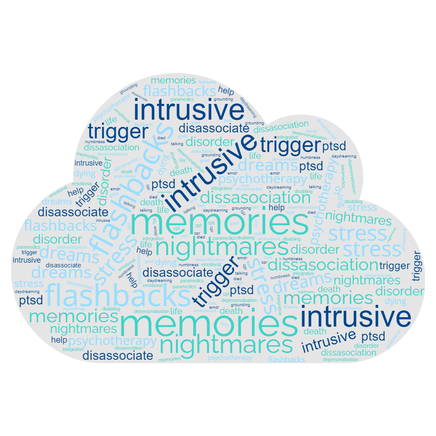 Just over four years ago, Tim died suddenly and unexpectedly next to me. I had to call 999, for only the second time in my life. The call handler dispatched the ambulance, and I pulled Tim onto the floor. The call handler talked me through CPR – I shouted 1-2-3-4 as I pressed down on his chest, and I can still feel in my bones the moments his ribs cracked. The paramedics arrived, and for a moment they thought they had restarted his heart – but no, he was gone. Tim's sudden death left me with dissociation, flashbacks, intrusive thoughts/memories and nightmares, all symptoms of post-traumatic stress disorder (PTSD). Flashbacks and intrusive memories Flashbacks are moments where you feel that the trauma is actually taking place again, right here and right now. Intrusive memories are unwelcome thoughts and memories that push themselves into our mind. Flashbacks and intrusive thoughts/memories can be triggered by lots of things – a smell, a sound, something you see. I had a flashback in the middle of a conference when someone coughed, and it sounded just like Tim's last breath. I wanted to run but couldn't get out. I repeated under my breath 'that was then, and this is now'. There is a brilliant video about intrusive memories from The Loss Foundation that explains more about why these happen. Dreams and nightmares There is a theory that dreams and nightmares are a way of our brains processing the events that we have been through, and storing our memories. If this is correct, it's not surprising that we have grief dreams. They're not always about our partners dying – I've had dreams about Tim coming back temporarily, about his death being a mistake, about him not dying at all but leaving me or me leaving him. Over time, the bad dreams do diminish, though they can pop back up after emotional moments or times of conflict. I do now have nice dreams about my parents, and about Tim. While I wake up sad, I think 'It was nice to see you again'. Dissasociation When you disassociate, you can feel unreal, and disconnected from yourself or the world. You might feel that the world around you is a film that you are watching, or that you are watching your life as an outsider. You might blank out, not remember what you are doing, or feel like you are daydreaming. It can come with a feeling of numbness. While dissociation in PTSD is similar to depersonalisation-derealisation disorder, a dissociative disorder that I have had in a mild form since my mid-teens, it is linked to a specific traumatic event. What to do For flashbacks and intrusive thoughts/memories, or after nightmares, telling yourself that it isn't real, and that the event is over, can help. Grounding techniques can also be useful. If flashbacks, intrusive memories and nightmares become disabling, talking to someone can help. I saw an integrative psychotherapist who used techniques based on CRM (comprehensive resource model), and this made a huge difference for me. EMDR (eye movement desensitization and reprocessing) and CPT (cognitive processing therapy) are also used in PTSD.
1 Comment
Adrianna
28/6/2023 13:47:02
Its the nightmares now, 3 months have passed and I don't know where they have gone or where I have been in them....facing homelessness, genuinely no family, no friends (he was all of that and more to me), quiet private peaceful people.....now the nightmares I have, Oh God the nightmares...or as bad...waking up and for a split second thinking he is still alive.....
Reply
Leave a Reply. |
AuthorI was widowed at 50 when Tim, who I expected would be my happy-ever-after following a marriage break-up, died suddenly from heart failure linked to his type 2 diabetes. Though we'd known each other since our early 20s, we'd been married less than ten years. Archives
July 2024
Categories
All
|


 RSS Feed
RSS Feed